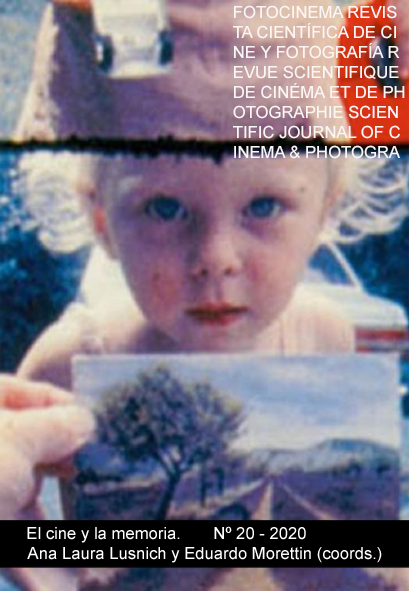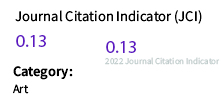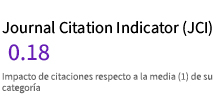Patricio Guzmán and the Aesthetics/Eethics of Water
DOI:
https://doi.org/10.24310/Fotocinema.2020.v0i20.7589Keywords:
Patricio Guzmán, Chile, documentary, memory, waterAbstract
The relationship between history, politics and memory has been a structuring milestone in the work of Chilean director Patricio Guzmán. With El botón de nácar (2015), the director intends to reflect on this relationship under the prism of water. It turns out to be the guiding thread of two main stories that Guzmán considers in the same dynamic: the Patagonia peoples and their extermination on the one hand, and the victims of the Pinochet dictatorship on the other. In addition to fulfilling an obvious narrative function, we will see how water tends to have a symbolic reach and becomes a vector of memory. The article proposes a reflection organized around the protagonism of water to highlight its ambivalence at a notional and formal level in the conception of documentary. The notion of memory that went through the work of Guzmán, the history of Chile, both related thanks to the water that reaches an unprecedented symbology will be addressed.
Downloads
Metrics
Publication Facts
Reviewer profiles N/A
Author statements
Indexed in
-
—
- Academic society
- N/A
- Publisher
- Universidad de Málaga
References
Bittinger, N. (2016). Surmonter la nature : entretien avec Emmanuelle Joly, monteuse de Patricio Guzmán. La Septième Obsession.
Cirlo, J.-E. (1992). Diccionario de símbolos. Barcelona: Ed. Labor.
De Baecque, A., Delage C. (dir.) (1998). De l’histoire au cinéma. Bruxelles: Ed. Complexe.
Cueva, H. (2008). La cuestio?n de la identidad chilena. Chile 2008: Percepciones y actitudes sociales, 4° Informe de la Encuesta Nacional ICSO-UDP, Santiago.
Eliade, M. (1969). Le mythe de l’éternel retour, París: Gallimard.
Estrada, I. (2013). El documental cinematográfico y televisivo contemporáneo: memoria, sujeto y formación de la identidad democrática española. Wood bridge: Tamesis books.
García-Ruiz, J. (2010). Las luchas por el reconocimiento, o la identidad como fenómeno global en las sociedades contemporáneas. Virajes 12-7. Universidad de Caldas, Colombia.
Gauthier, G. (2000). Le documentaire un autre cinéma. París: Nathan.
Javier Millán, F. (2001). La memoria agitada: cine y represión en Chile y Argentina. Madrid: Ocho y Medio Libros de cine.
Manrique, J. (1983). Coplas a la muerte de su padre. Madrid: Castalia.
Morales Lastra, E. (2015). Crítica a El botón de nácar de Patricio Guzmán: Una líquida metáfora sobre la identidad difusa de Chile. Chile: El Mostrador.
Muñoz Barquero, E. (1995). Eterno retorno e historia: el caso de Nietzsche. Revista de Filosofía Universidad de Costa Rica, XXXIII (80).
Paranaguá, P.-A. (Ed.) (2003). Cine documental en América latina. Madrid: Cátedra.
Ricoeur, P. (2000). La mémoire, l'histoire, l'oubli. París: Seuil, 2000.
Ruffinelli, J. (2001). Patricio Guzmán. Madrid: Cátedra.
Ruffinelli, J. (2008). El cine de Patricio Guzmán: en busca de las imágenes verdaderas. Chile: Uqbar Ed.
Valenzuela, V. (2011). Giro subjetivo en el documental latinoamericano. laFuga, 12.
Ricciarelli, C. (2011) El cine documental segu?n Patricio Guzma?n, Santiago de Chile: Culdoc.
Downloads
Published
How to Cite
Issue
Section
License
All contents published in Fotocinema Revista científica de cine y fotografía are protected under the Creative Commons Attribution-NonCommercial-ShareAlike 4.0 International (CC BY-NC-SA 4.0) license. All about this license is available in the following link: <http://creativecommons.org/licenses/by-nc-sa/4.0>
Users can copy, use, redistribute, share and exhibit publicly as long as:
- The original source and authorship of the material are cited (Journal, Publisher and URL of the work).
- It is not used for comercial purposes.
- The existence of the license and its especifications are mentioned.
There are two sets of authors’ rights: moral and property rights. Moral rights are perpetual prerogatives, unrenounceable, not-transferable, unalienable, imprescriptible and inembargable. According to authors’ rights legislation, Fotocinema. Revista científica de cine y fotografía recognizes and respects authors moral rights, as well as the ownership of property rights, which will be transferred to University of Malaga in open access. The property rights are referred to the benefits that are gained by the use or the dissemination of works. Fotocinema. Revista científica de cine y fotografía is published in an open access form and it is exclusively licenced by any means for doing or authorising distribution, dissemination, reproduction, , adaptation, translation or arrangement of works.
Authors are responsable for obtaining the necessary permission to use copyrighted images.














13.png)



